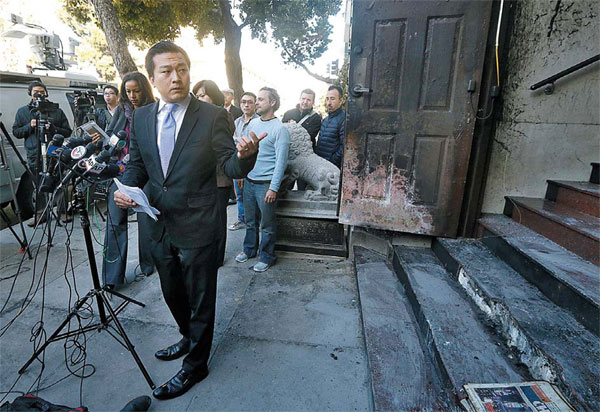Terrorism ruled out in consulate arson
As investigation continues in San Francisco, China calls on the US to enhance security
An arson attack on China's consulate general in San Francisco on New Year's Day was not the work of terrorists, the FBI said.
Federal Bureau of Investigation spokesman Peter Lee said on Thursday the bureau is not investigating the incident as an act of terrorism and that the fire was caused by using a gas-based liquid with accelerants.
The Chinese Foreign Ministry said on Friday that the attack is still being investigated.
Ministry spokesman Qin Gang said at a daily news briefing that no individual or organization has been confirmed as being responsible for the attack.
Surveillance cameras inside the consulate showed a person getting out of a minivan in front of the building, splashing the front gate with two buckets of gasoline and then setting it on fire at 9:25 pm on Wednesday.
Qin said on Thursday in Beijing, a few hours after the attack, "The Chinese Foreign Ministry and relevant diplomatic missions in the US have lodged solemn representations with the US side, requiring it to solve the case as soon as possible."
China also asked the US to bring the perpetrators to justice, take effective measures to enhance the protection of Chinese diplomatic missions and staff members in the US and prevent the recurrence of similar incidents, he added.
The consulate said no casualties have been reported, but the building has been seriously damaged.
Chinese diplomatic missions overseas are rarely attacked, but the San Francisco consulate was also targeted five years ago when an unidentified person set fire to the visa office.
Wang Chuan, spokesman for the consulate, said in San Francisco on Thursday: "We have initiated emergency security procedures and are in close contact with the San Francisco police. No visa application or non-visa services have been affected.
"There were no casualties, as the arson attack happened out of working hours. But this despicable act caused severe damage to consulate facilities and posed a threat to the safety of the consulate staff, their family members and the neighborhood."
The steel-encased wooden door and the windows in the main entrance were charred and damaged in the fire and will not be repaired any time soon, as they are being held as evidence, Wang said.
US State Department spokeswoman Marie Harf said it is too early to judge whether security at the consulate is adequate.
"We take this incident very seriously, and the Bureau of Diplomatic Security is working with the FBI and local authorities to investigate and apprehend the perpetrators," she said.
Zhang Jie, a Chinese lawyer and visiting scholar from Chicago, told China Daily he drove an hour from his hotel to show his support for the consulate.
"I don't think this arson attack will influence the Sino-US relationship, but the US government must take this incident seriously and find out who committed the crime," he said. "They must give an answer to the Chinese government."
Visa applicant Leo Young said the US government should condemn the case as a terrorist attack.
"Terrorism, right, it's terror ... the same as any group attacking the US embassy and consulates in foreign countries," Young was quoted by ABC News as saying.
Contract the writers at chenjia@chinadaily.com.cn and zhaoyanrong@chinadaily.com.cn
|
Wang Chuan, spokesman for China's consulate general in San Francisco, speaks to the media outside the damaged entrance to the building on Thursday. The consulate said its compound was damaged in an arson attack on New Year's Day and urged US authorities to protect the safety of its diplomats and its premises. Jeff Chiu / Associated Press |



















